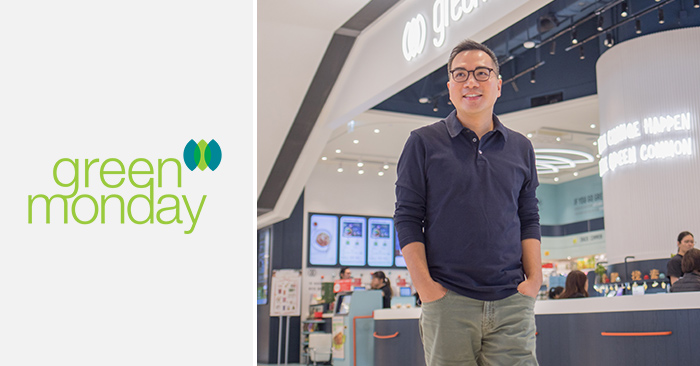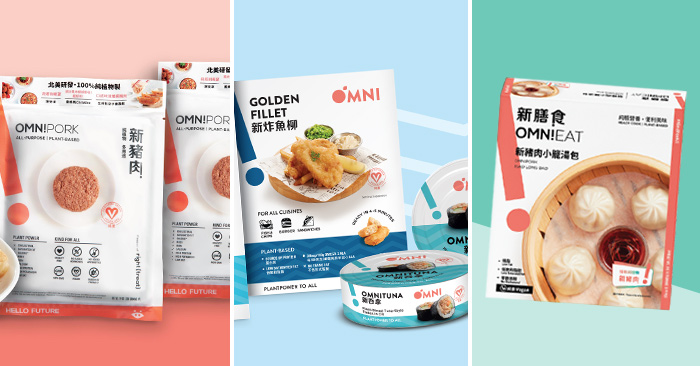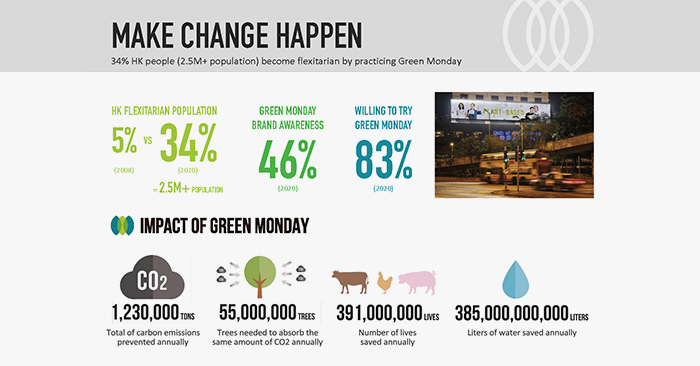OmniFoods Encourages Plant-based On A Global Scale

Alt-protein maker OmniFoods has set its sights on increasing the accessibility and presence of plant-based foods in traditional cuisine, thus encouraging consumers across the globe to adopt flexitarian diets. According to David Yeung, founder of Green Monday, the parent company of OmniFoods, his strategy is to take a multifaceted approach to increase flexitarianism. Through a variety of finished CPG products, foodservice and brand partnerships, and an investment portfolio featuring plant-based brands, he seeks to engage both existing plant-based consumers and those who still view vegetable-based meat replacements as “a novel idea.”
What is Green Monday?
Founded in 2012, the Hong Kong-based social startup aims to tackle issues such as climate change, food insecurity, public health and animal welfare by “making low-carbon and sustainable living simple, viral and actionable,” according to Yeung. Beginning as a participant-driven pledge to forgo eating meat and dairy on Mondays, the idea evolved into the Green Monday Foundation, which has secured hundreds of partnerships with schools, corporations and restaurants around the world to increase advocacy for various sustainability campaigns.
Since then the company has developed into a “hybrid” platform with sustainability serving as the link between its social arm (Green Monday Foundation) and its three commercial branches. In 2015, it opened the first Green Common location, a chain of plant-based quick-service dining and retail stores now in Hong Kong, Singapore, and Shanghai. In 2018, the company launched OmniFoods, a food-tech brand focused on alt-proteins.
“Plant-based food is not just [about] products,” Yeung stated. “They stand for something. We are trying to catalyze behavioral change and ultimately combat all the problems that we strive to improve.”
Still, products play a key role, with Green Monday launching branded OmniFood plant-based meat, seafood and meal options. Made with a blend of soy, peas, shiitake mushrooms and rice, the company’s products are currently distributed to over 20 international markets with approximately 40,000 points of sale. Yeung said the end goal is to create authentic, plant-based food alternatives that are “omnipresent” within the global food system, a notion to which he pays tribute with Omni’s name.
Alongside its CPG and foodservice efforts, the company has continually invested in plant-based food and beverage companies through its VC arm, Green Monday Ventures, offering brands capital as well as strategic assistance. For example, portfolio brands including Califia Farms, Perfect Day and Beyond Meat launched in Hong Kong at Green Common locations.

What’s happening now?
Introduced in Hong Kong and primarily marketed in China, OmniFoods is now on the move in the U.S. In September, the company announced it was entering the market with OmniPork Luncheon, Strips and Ground products. The announcement came less than a year after Green Monday closed a $70 million funding round to expand OmniFoods’ R&D capabilities and increase production and distribution for the flagship OmniPork line.
Globally, Omni’s CPG portfolio includes more than just the pork alternatives found in the freezers of Sprouts and Whole Foods. This summer, the company introduced OmniSeafood, available in frozen breaded Golden Filets, Classic Fish Filets and in shelf-stable canned tuna and crab meat products. While Yeung noted that the launch fills an “empty space” for alt-seafood – a category which includes only a handful of emerging brands such as Good Catch and New Wave Foods – he said the innovation was primarily driven by the potential for market penetration in Asia, a region which he said accounts for 73% of global seafood consumption.
As its global expansion continues to ramp up, OmniFoods is also focused on engaging consumers in Asia markets through new products centered around traditional comfort foods, through its OmniEats line. Available at Green Common locations and on its e-commerce platform, the company has introduced a variety of products using OmniFoods’ proteins as the key ingredient, ranging from OmniPork Strip Spaghetti with Black Pepper Sauce to soup dumplings, gyoza and pork buns.

How is Omni working toward its goal?
OmniFoods is taking a global-to-local approach. With each new market, the OmniFoods team considers not only the product type and format, but also its brand positioning and where it will be sold. This can range from launching different items in different countries, to even changing formulations to align specific products to geographies and regions.
That approach is an inherent part of Omni’s R&D process, according to Yeung. While it is largely due to differences between each country’s ingredient regulations, he said, this process is also driven by regional differences in consumer preference, noting that newer companies don’t often consider both of these hurdles when looking to expand internationally.
“The regulation in Japan is not the same as the regulation in Korea, it is more than just the language difference, it is a technical requirement difference,” he stated and later emphasized the regional disparities: “people from Northern China, when they eat our buns or our dumplings, they will immediately tell you that your bun is no good – that’s not our type of bun.”
While on-premise and foodservice have been the primary modes of driving consumer adoption in countries where plant-based eating is still relatively niche, Yeung said Omni entered the U.S. with a fairly simple approach: go where the plant-based consumer already was and position itself as an authentic alternative.
“You don’t need to be an American to eat a burger, just like you don’t have to be Chinese or Japanese to eat gyoza or dumpling,” Yeung said. “But given our roots, we certainly are much more authentic on that front for the Western markets, so that is our positioning there.”
What’s next?
Omnifoods’ next priority is scaling operations across its existing 20 markets while continuing to expand its geographic reach and market penetration. The company’s current R&D team is in Canada and products are manufactured at its facilities in Thailand and Mainland China.
He also noted that the production process will undergo improvements in the near future as the company works to unveil Omni 2.0 and 3.0 versions of its protein technology. Although he would not specify a timeline for the launch, he did confirm the new technology will be integrated into both new and existing product lines.
“Hopefully our products can be global, and then ultimately adopted by as many people as possible and be one of the catalysts of that shift [to sustainable food systems],” said Yueng. “I am proud of the fact that our understanding of both the east and the west, put us truly and literally on the map and introduced this new lifestyle to many new consumers.”














![[Exclusive] Sweet Loren’s Extends With Protein-Focused Offerings](https://d2azl42aua8mom.cloudfront.net/wp-content/uploads/2026/03/02165734/2026-03-02-sweet-loren-s-extends-with-protein-focused-offerin-square-150x150.png)


